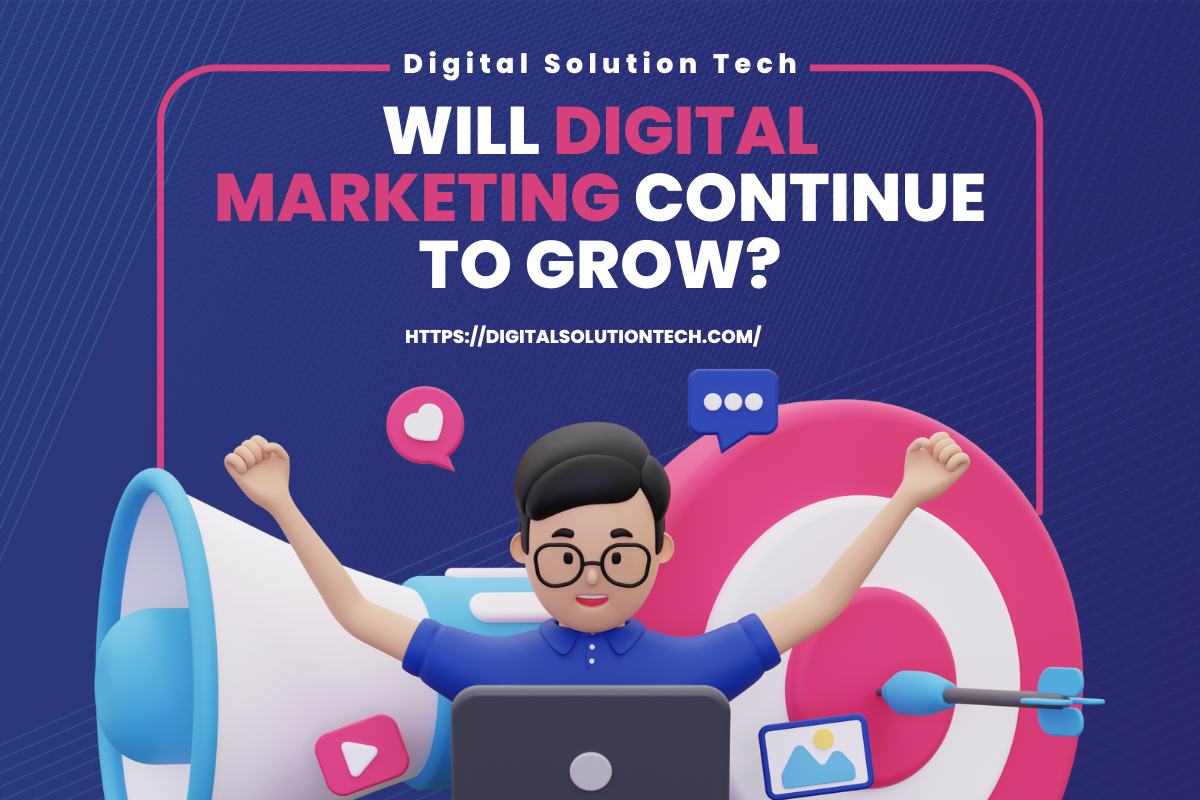The world of digital marketing has experienced exponential growth over the past two decades. What began as a niche area of marketing has now transformed into one of the most crucial components of a brand’s overall strategy. As technology advances, consumer behavior shifts, and new platforms emerge, digital marketing’s significance is only expected to rise. But the question remains: will digital marketing continue to grow, or have we reached a point where its growth will plateau?
Current Trends Point to Continued Growth
To predict the future of digital marketing, it’s essential to examine the current trends and how they reflect its potential for growth. The last several years have seen dramatic changes in digital marketing, driven by technological innovations and the evolving needs of businesses and consumers.
1. Mobile First: One of the most significant shifts in digital marketing is the growing dominance of mobile devices. Smartphones and tablets have become the primary devices for internet access, leading businesses to optimize their websites and marketing strategies for mobile-first experiences. With mobile commerce and app-based marketing expanding, digital marketing must continue evolving to cater to mobile users, further fueling growth.
2. Social Media Dominance: Social media platforms like Facebook, Instagram, TikTok, and LinkedIn have transformed how brands interact with consumers. Social media marketing is no longer just about advertising; it’s a comprehensive strategy that involves engagement, customer service, influencer partnerships, and content creation. Given that millions of people worldwide engage with social platforms daily, businesses that fail to invest in social media marketing risk missing out on a vast and highly engaged audience. As platforms continue to evolve and grow, the scope of digital marketing on social channels will expand.
3. Video Content: Video consumption has exploded in recent years, with platforms like YouTube, TikTok, and Instagram Reels making video marketing more popular than ever. Videos are considered one of the most engaging types of content, making them a top choice for marketers. As the demand for short-form and long-form video content continues to rise, digital marketers will have to focus more on producing high-quality, engaging videos that resonate with their target audience.
4. Artificial Intelligence and Automation: AI and machine learning technologies are being used to optimize digital marketing campaigns in ways that were not possible before. Tools like chatbots, predictive analytics, and personalized content delivery are enhancing user experiences and streamlining marketing operations. These innovations will only continue to advance, driving even more sophisticated and efficient digital marketing strategies. Automation, in particular, is making it easier for brands to scale their efforts without sacrificing quality.
5. Voice Search and Smart Devices: The rise of voice-activated assistants like Amazon Alexa, Google Assistant, and Apple Siri has changed the way people search for information. Voice search is becoming an increasingly significant factor in SEO, as users tend to phrase their queries differently when speaking rather than typing. As smart home devices become more integrated into daily life, businesses will need to adjust their digital marketing strategies to remain visible in voice search results, further driving growth.
6. Personalization and Data-Driven Marketing: The demand for personalized experiences has never been higher. Consumers expect tailored content, recommendations, and offers based on their preferences and behavior. Digital marketers are using data analytics and customer insights to craft highly personalized campaigns that resonate with individuals on a deeper level. As the amount of consumer data available increases, the ability to create highly personalized, relevant experiences will only improve, fueling further growth in the digital marketing sector.
The Increasing Role of E-Commerce
The COVID-19 pandemic accelerated the shift toward online shopping, and e-commerce continues to thrive in the post-pandemic era. Digital marketing plays a critical role in driving e-commerce success, from paid search campaigns to social media marketing and email campaigns. As more consumers opt for online shopping, digital marketing will be indispensable for e-commerce businesses looking to remain competitive.
Even beyond traditional e-commerce, innovations like augmented reality (AR) and virtual reality (VR) are enhancing the online shopping experience, allowing consumers to virtually try on products or experience them in real-time environments. These immersive experiences are creating new avenues for digital marketers to explore, further expanding the potential of digital marketing in the e-commerce space.
Emerging Technologies and Future Innovations
As digital marketing continues to grow, emerging technologies will play a central role in shaping its future. The rise of blockchain, for example, has the potential to improve data security and transparency in digital advertising. Marketers are increasingly interested in how blockchain can help reduce fraud in digital advertising, providing a more trustworthy experience for both consumers and businesses.
Additionally, as virtual and augmented reality technologies mature, businesses will have new opportunities to create immersive and engaging experiences for their customers. From virtual product trials to interactive advertisements, these technologies could revolutionize digital marketing in ways we can’t yet fully imagine.
Challenges and Considerations
While the growth of digital marketing seems almost inevitable, it’s not without its challenges. Privacy concerns, data protection regulations, and the increasing complexity of digital ecosystems are some of the hurdles marketers will face in the years ahead. Striking the right balance between personalization and privacy will be crucial, as consumers become more aware of how their data is being used.
Another challenge is the saturation of digital spaces. With more businesses investing in digital marketing, standing out amidst the noise will require even more creative and targeted strategies. As competition grows, companies will need to constantly innovate and refine their digital marketing approaches to stay ahead.
Conclusion: The Future of Digital Marketing
All signs indicate that digital marketing will continue to grow and evolve in the coming years. The integration of new technologies, the increasing reliance on mobile and social media, and the demand for personalized experiences all point to a bright future for the industry. Although there are difficulties, they also offer chances for creativity and development. Businesses that remain adaptable, creative, and data-driven will be best positioned to thrive in the ever-changing landscape of digital marketing.
In summary, digital marketing is not just a passing trend; it is an essential component of modern business strategy. With continued advancements in technology and shifts in consumer behavior, digital marketing will only become more sophisticated, offering new ways for brands to engage with customers and drive business growth.
At Digital Solution Tech we are specialized in SMM, SMO, SEO, Web Development, PPC, E-mail Marketing, Copywriting, Blogging and Google Analytics.
Visit our website – https://digitalsolutiontech.com/
Contact Us – info@digitalsolutiontech.com







Leave A Comment